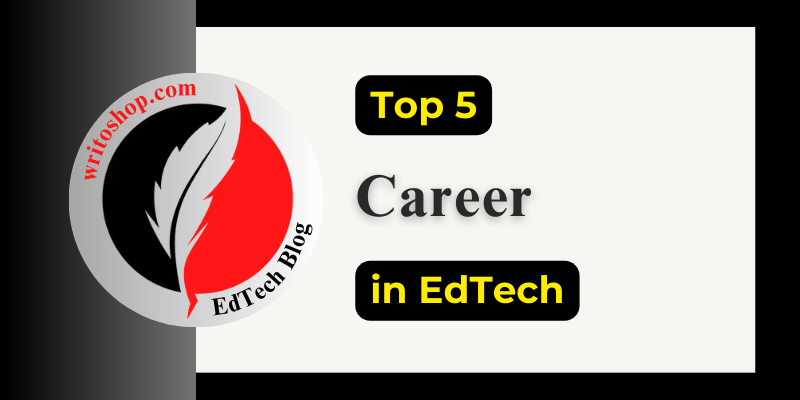
In today’s fast-paced digital age, education is no longer confined to textbooks and chalkboards. Technology has transformed the way we learn, teach, and share knowledge.
As a result, the field of educational technology (EdTech) is booming, creating exciting and meaningful career opportunities.
Whether you’re a teacher looking to transition into tech or a tech enthusiast passionate about education, there’s a role for you in this evolving industry.
Here are the top 5 careers in educational technology that are reshaping the future of learning.
1. Instructional Designer
Role Overview:
Instructional designers are the architects behind engaging and effective learning experiences. They design curriculum and training materials using principles of pedagogy and technology. Their goal is to make learning both accessible and impactful.
Key Responsibilities:
- Create lesson plans, online modules, and course structures
- Work with subject matter experts to develop content
- Utilize Learning Management Systems (LMS) like Moodle or Canvas
- Analyze learner performance and course effectiveness
Skills Required:
- Strong understanding of learning theories
- Experience with authoring tools like Articulate Storyline, Adobe Captivate
- Project management and communication skills
As online and hybrid learning become standard, the need for well-structured, tech-supported instruction continues to grow.
2. E-learning Developer
Role Overview:
E-learning developers are tech-savvy professionals who bring instructional designers’ plans to life. They build interactive online courses using multimedia elements like videos, animations, simulations, and quizzes.
Key Responsibilities:
- Develop web-based training (WBT) and computer-based training (CBT) modules
- Integrate multimedia and gamified elements
- Ensure cross-device and cross-browser compatibility
- Troubleshoot technical issues in learning platforms
Skills Required:
- Proficiency in HTML5, CSS, JavaScript
- Experience with e-learning tools like Lectora, iSpring
- Graphic design and video editing basics
The rise of digital-first learning environments and corporate training programs has significantly increased the need for interactive, engaging e-learning content.
3. Educational Consultant (EdTech Consultant)
Role Overview:
Educational consultants help schools, universities, and organizations integrate technology into teaching and learning. They provide training, guidance, and customized solutions to improve learning outcomes.
Key Responsibilities:
- Evaluate current educational tools and recommend tech upgrades
- Conduct teacher training and workshops
- Develop strategies for digital transformation in education
- Analyze learning data to improve teaching methods
Skills Required:
- Strong knowledge of EdTech tools and trends
- Excellent interpersonal and problem-solving skills
- Experience in educational leadership or instructional coaching
Institutions are increasingly investing in digital infrastructure. Consultants help bridge the gap between traditional teaching and technology-enabled learning.
4. Learning Experience Designer (LXD)
Role Overview:
An LXD focuses on the learner’s journey from start to finish. They use user experience (UX) principles to create intuitive and enjoyable learning environments, combining pedagogy with design thinking.
Key Responsibilities:
- Conduct learner research and build personas
- Design user-centered learning experiences
- Collaborate with graphic designers, developers, and educators
- Optimize course navigation, layout, and accessibility
Skills Required:
- UX design and research skills
- Knowledge of learning sciences and psychology
- Familiarity with wireframing tools like Figma or Adobe XD
As learners expect seamless digital experiences, companies and schools are hiring LXDs to ensure content is both effective and user-friendly.
5. Education Data Analyst
Role Overview:
With the growing use of learning platforms and assessment tools, vast amounts of educational data are being generated. Education data analysts help institutions make informed decisions using this data.
Key Responsibilities:
- Collect and clean education-related data
- Analyze learning outcomes and performance metrics
- Create dashboards and reports for stakeholders
- Identify trends and recommend instructional improvements
Skills Required:
- Proficiency in Excel, SQL, Python or R
- Understanding of education systems and standards
- Ability to visualize data using tools like Tableau or Power BI
Data-driven decision-making is now central to personalized learning, student retention, and academic success strategies.
Conclusion
Educational technology is more than just a buzzword—it’s a revolution in how we learn and teach.
Whether you’re passionate about designing effective learning journeys or crunching data to improve education systems, there’s a rewarding career path waiting for you.
These top five EdTech careers offer the perfect blend of purpose, innovation, and growth.
The future of learning is digital. Are you ready to be part of it?
